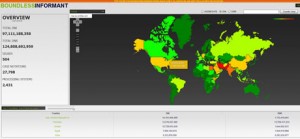Robert Mueller’s Claims to Be Ignorant about Geolocation Probably Bullshit
As I laid out in this Guardian column on today’s House Judiciary Committee hearing, after citing Smith v. Maryland a bunch of times to justify getting all Americans’ phone records, FBI Director Robert Mueller went on to pretend not to know whether those records include geolocation.
New York Representative Jerry Nadler wasn’t convinced Mueller’s excuse was good enough. He noted that metadata includes so much more information than it did in 1979, and that that earlier ruling might not stand in this case. Utah’s Jason Chaffetz got much more specific about the difference between phones in 1979 and now: location.
Landlines include location information. But with cell phones, the same location information necessary to route a call effectively provides a rough idea of where a person is even as they move from place to place (map functions on smart phones, as well as a lot of applications, rely on this data). Thus, the geolocation available as part of cell phone metadata provides a much better idea of where a person goes and what they do than location data for a landline tied to a person’s address.
Chaffetz posed several questions that, he revealed, he had sent Mueller Wednesday so that he would be prepared to answer, starting with whether or not geolocation is part of this metadata collection. In spite of Chaffetz’s prior warning, Mueller said he did not know whether it was included.
Note that the order to Verizon the Guardian publishedspecifically includes routing information in its description of metadata, which gets to geolocation. It’s clear this collection includes geolocation.
Mueller was also unprepared to answer whether or not a different supreme court case from last year, US v Jones, which determined that installing a GPS tracking device on a suspect’s car constituted a search, meant that the geolocation provided by the GPS function on cell phones did not qualify as metadata. Mueller was also unprepared to answer whether tracking someone’s location by using their phone constituted metadata.
In fact, Mueller admitted his staffers had told him he’d be asked these questions – yet still hadn’t prepared. It seemed almost as if his inability to answer this question in public was intentional.
As I suggested, Mueller’s feigned ignorance was probably intentional.
Moreover, his professed ignorance about whether the phone records include location is probably bullshit. That’s true, as I noted, because the order in question includes routing information, which in the case of cell phones, includes tower location which is location.
And remember, according to Tom Coburn, the FBI Director’s role in approving this process is so central, Coburn was worried that legal challenges to Mueller’s two-year extension might put the entire dragnet program at risk. So it’s hard to believe all this time Mueller has been personally vouching for orders like the one to Verizon that ask explicitly for routing information without knowing he was asking for routing information.
Here’s the other reason I think Mueller is telling a least untruth that is too cute by half when he claims ignorance.
Shortly after the US v. Jones ruling, Ron Wyden asked Director of National Intelligence James Clapper to what degree Jones affected the intelligence community. He even invoked “secret law,” the way he always has done when referring to this dragnet program(s).
Wyden: Director Clapper, as you know the Supreme Court ruled last week that it was unconstitutional for federal agents to attach a GPS tracking device to an individual’s car and monitor their movements 24/7 without a warrant. Because the Chair was being very gracious, I want to do this briefly. Can you tell me as of now what you believe this means for the intelligence community, number 1, and 2, would you be willing to commit this morning to giving me an unclassified response with respect to what you believe the law authorizes. This goes to the point that you and I have talked, Sir, about in the past, the question of secret law, I strongly feel that the laws and their interpretations must be public. Read more →

